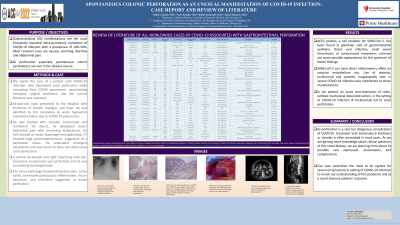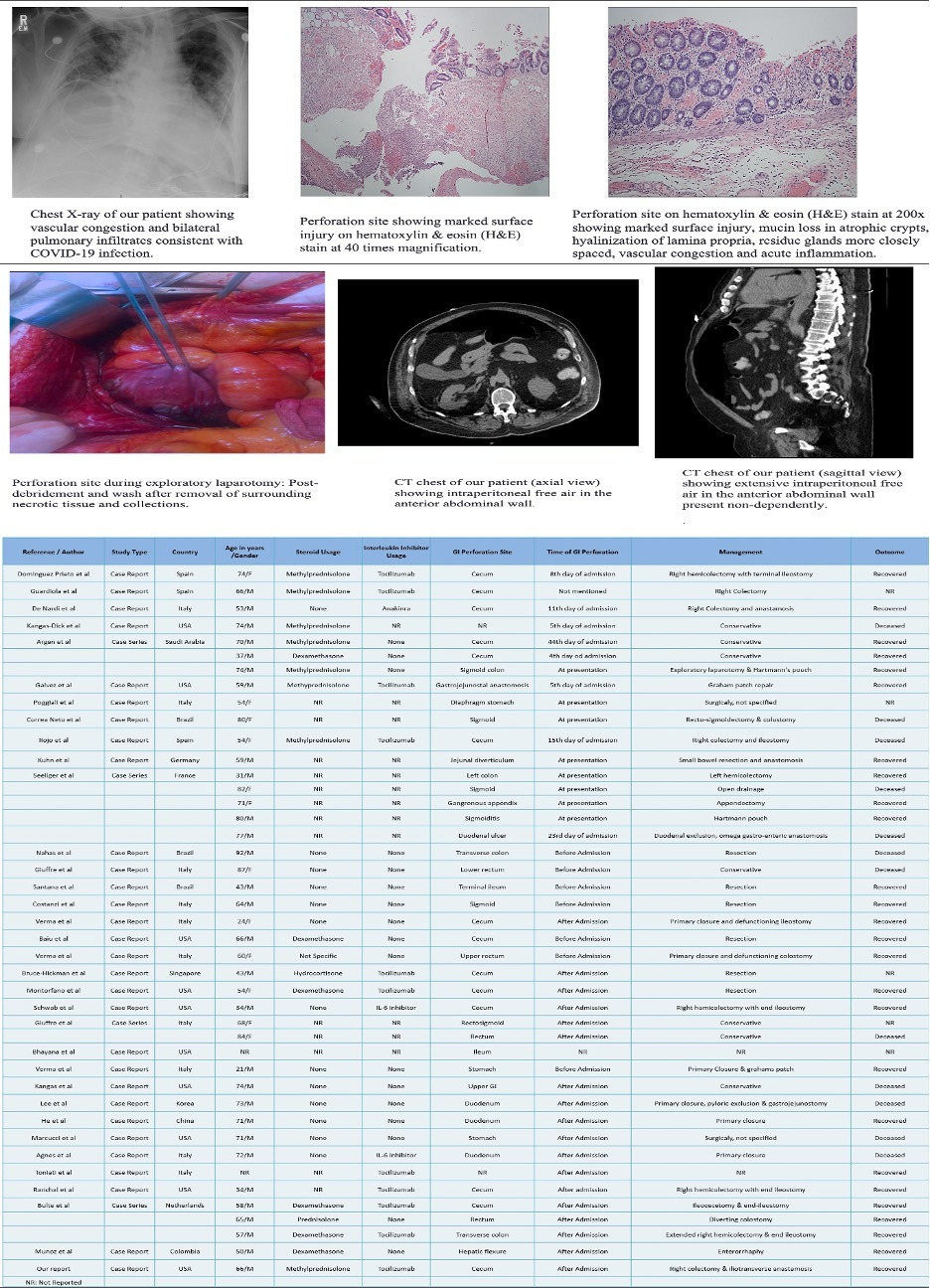Back


Poster Session B - Monday Morning
Category: Colon
B0139 - Spontaneous Colonic Perforation as an Unusual Presentation of COVID-19 Infection: Case Report and Review of Literature
Monday, October 24, 2022
10:00 AM – 12:00 PM ET
Location: Crown Ballroom

Has Audio

Vishal Chandel, MD
Suburban Community Hospital
Norristown, PA
Presenting Author(s)
Vishal Chandel, MD1, Neel Chandel, MD2, Robin Zachariah, MD3, Emad Mansoor, MD4
1Suburban Community Hospital, Norristown, PA; 2Roxborough Memorial Hospital, Philadelphia, PA; 3Duke Health, Durham, NC; 4University Hospital Medical Center, Cleveland, OH
Introduction: Gastrointestinal (GI) manifestations are most frequently reported extra-pulmonary symptoms of COVID-19 infection with a prevalence of 10%-50%. Most common are nausea, vomiting, diarrhea, and abdominal pain. GI perforation especially spontaneous colonic perforations are rare in the disease course.
Case Description/Methods: We report a patient with COVID-19 infection, who developed cecal perforation while recovering from COVID pneumonia, necessitating emergent surgical treatment, and the current literature was reviewed.
A 65-year-old male presented with shortness of breath, myalgias and fever. He was admitted to ICU secondary to acute hypoxemic respiratory failure due to COVID 19 pneumonia. He was treated with steroids, tocilizumab and remdesivir. On day-11, he developed severe abdominal pain with worsening leukocytosis. His imaging showed large pneumoperitoneum, suggestive of a perforated viscus. He underwent emergent laparotomy and was found to have non-obstructive cecal perforation. A colonic de-tension and right colectomy with ileo-transverse anastomosis was performed. The tissue pathology showed distended colon, active colitis, transmural granulocytic inflammation, and ulceration suggesting bowel perforation.
Discussion: ACE2 protein, a cell receptor for SARS-CoV-2, is in glandular cells of gastrointestinal epithelia. Direct viral infection, small vessel thrombosis, or nonocclusive mesenteric ischemia can cause spectrum of bowel findings. SARS-CoV-2 can have direct inflammatory effect on vascular endothelium too. Use of steroids, tocilizumab and systemic coagulopathy seen in severe COVID-19 infection also contributes to these manifestations. In our patient, an acute over-distension of colon, without mechanical distal obstruction, in the setting of COVID-19 infection & tocilizumab led to cecal perforation. Our literature review confirmed only 33 case-studies of bowel perforation in the setting of COVID-19 infection have been reported, with combined 28.5% mortality rate. Considering the worldwide incidence of this pandemic, it is a rare complication.
GI perforation is a rare but dangerous complication of COVID-19. Treatment with interleukin-6 inhibitors or steroids is often associated in most cases. Our case underlines the need to be vigilant for severe GI symptoms in setting of COVID-19 infection to improve patients’ outcome.

Disclosures:
Vishal Chandel, MD1, Neel Chandel, MD2, Robin Zachariah, MD3, Emad Mansoor, MD4. B0139 - Spontaneous Colonic Perforation as an Unusual Presentation of COVID-19 Infection: Case Report and Review of Literature, ACG 2022 Annual Scientific Meeting Abstracts. Charlotte, NC: American College of Gastroenterology.
1Suburban Community Hospital, Norristown, PA; 2Roxborough Memorial Hospital, Philadelphia, PA; 3Duke Health, Durham, NC; 4University Hospital Medical Center, Cleveland, OH
Introduction: Gastrointestinal (GI) manifestations are most frequently reported extra-pulmonary symptoms of COVID-19 infection with a prevalence of 10%-50%. Most common are nausea, vomiting, diarrhea, and abdominal pain. GI perforation especially spontaneous colonic perforations are rare in the disease course.
Case Description/Methods: We report a patient with COVID-19 infection, who developed cecal perforation while recovering from COVID pneumonia, necessitating emergent surgical treatment, and the current literature was reviewed.
A 65-year-old male presented with shortness of breath, myalgias and fever. He was admitted to ICU secondary to acute hypoxemic respiratory failure due to COVID 19 pneumonia. He was treated with steroids, tocilizumab and remdesivir. On day-11, he developed severe abdominal pain with worsening leukocytosis. His imaging showed large pneumoperitoneum, suggestive of a perforated viscus. He underwent emergent laparotomy and was found to have non-obstructive cecal perforation. A colonic de-tension and right colectomy with ileo-transverse anastomosis was performed. The tissue pathology showed distended colon, active colitis, transmural granulocytic inflammation, and ulceration suggesting bowel perforation.
Discussion: ACE2 protein, a cell receptor for SARS-CoV-2, is in glandular cells of gastrointestinal epithelia. Direct viral infection, small vessel thrombosis, or nonocclusive mesenteric ischemia can cause spectrum of bowel findings. SARS-CoV-2 can have direct inflammatory effect on vascular endothelium too. Use of steroids, tocilizumab and systemic coagulopathy seen in severe COVID-19 infection also contributes to these manifestations. In our patient, an acute over-distension of colon, without mechanical distal obstruction, in the setting of COVID-19 infection & tocilizumab led to cecal perforation. Our literature review confirmed only 33 case-studies of bowel perforation in the setting of COVID-19 infection have been reported, with combined 28.5% mortality rate. Considering the worldwide incidence of this pandemic, it is a rare complication.
GI perforation is a rare but dangerous complication of COVID-19. Treatment with interleukin-6 inhibitors or steroids is often associated in most cases. Our case underlines the need to be vigilant for severe GI symptoms in setting of COVID-19 infection to improve patients’ outcome.

Figure: Images of chest xay, pathology, perforation site and CT scan along with review of literature of all the worldwide cases of colonic perforation
Disclosures:
Vishal Chandel indicated no relevant financial relationships.
Neel Chandel indicated no relevant financial relationships.
Robin Zachariah indicated no relevant financial relationships.
Emad Mansoor indicated no relevant financial relationships.
Vishal Chandel, MD1, Neel Chandel, MD2, Robin Zachariah, MD3, Emad Mansoor, MD4. B0139 - Spontaneous Colonic Perforation as an Unusual Presentation of COVID-19 Infection: Case Report and Review of Literature, ACG 2022 Annual Scientific Meeting Abstracts. Charlotte, NC: American College of Gastroenterology.
